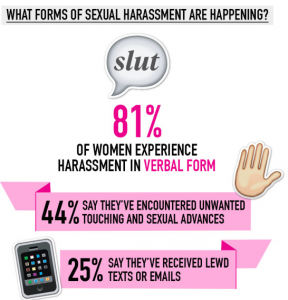“Come on, open the door,” I said, not sure of what to do.
I waited for him to move, but he stood his ground in front of the doorknob. It was past midnight, and I remained trapped in his room. I wondered how long I would remain here before our friends took notice of my sudden disappearance. Since I met him in October 2014, I called James* my friend. He was a “nice guy” who swore off casual sex, alcohol and drugs. He went out of his way to walk me home at night. He was incredibly polite. But as we became close friends, I began to see two very different sides to his personality.
At night, he sent me heartfelt text messages, but when we fought, he locked me in his room and refused to let me leave. He told me that he wanted the best for me, but when I rejected what I thought were his romantic advances and showed interest in someone else, James threatened to hurt himself.
He humiliated me when we were alone and shamed me, implying that I was easy, a slut and a whore.
Though our friendship had caught on quickly in the beginning, by January I felt trapped and helpless. Unfortunately, experiences like mine are incredibly common.
According to a study done in 2006 by the American Association of University Women Educational Foundation, nearly two-thirds of college students experience some type of sexual harassment. This can include physical harassment such as groping, non-contact forms of harassment like catcalling, and harassment through electronic messages. While the sexual harassment I experienced never left any physical scars or bruises, the criticism and judgment of my personality and sexuality chipped away at my feeling of safety and self-esteem.
The abusive behavior became my new normal.
But it took a sudden escalation for me to even realize I needed help. The texts came in at 11:34 p.m. on a Sunday while I studied in the MLC. James accused me of having sexual relations with his roommate. He explained that he had talked to the UGA police, filing a charge of simple battery against his roommate in retaliation for my “betrayal.” I denied the accusation, trying to get him to understand that his roommate and I were only friends but James refused to listen.
Instead, he went on a rant about how I broke his heart and texted the words, “I wanted to f*****g kill myself.”
He had made threats of suicide and self-harm often, but this time he took it further. He threatened to ruin my chances of having a career, to expose my private sexual history to everyone I knew, and to throw my friends in jail by reporting their drug and alcohol use to the police. After receiving those threatening texts, I spent three days locked in my dorm room. For all I knew, any friend seen with me could be his next target. Those three days gave me time to think, and I started to remember the person I used to be.
I headed down to the lobby of my residence hall and spilled the entire story for the first time to an adviser. The tears that came unexpectedly surprised me, and I was touched that the adviser took the time to listen and then drove me directly to RSVP, UGA’s Relationship and Sexual Violence Prevention center located within the University Health Center. There I told my story again, and the RSVP staff told me that I had been emotionally abused. James’s threats of suicide and self-harm were tactics used to manipulate me. His unpredictable behavior was textbook relationship abuse. The unwanted romantic advances fell under sexual harassment, and the unrelenting text messages he kept sending after I asked him to stop were a form of stalking.
The RSVP staff told me that with the text messages I saved on my phone, I could have a real case if I wanted to pursue it through the university system.
I thought this meant my battle against James would be over, but I was wrong. The process had only just begun.
Shortly after speaking with RSVP that day, I received an email telling me I had an appointment with the Equal Opportunity Office that Friday — Jan. 30. Though most UGA code of conduct violations are handled through the University Judiciary, cases like mine that have to do with Title IX are handled through a completely different system. I had presumed University Judiciary would handle my case. But searching online and through student handbooks and pamphlets, I learned that UGA’s Equal Opportunity Office handled issues like sexual harassment, sexual assault/rape, and discrimination because they fall under Title IX, the federal law that prohibits discrimination based on sex at federally funded educational institutions. I didn’t even know the EOO existed, let alone where it was.
I spent the spring semester of my freshman year writing email after email and playing phone tag with offices and departments I had only just discovered. In the midst of it all, friends and acquaintances deserted me once word of my decision to file a sexual assault complaint spread. Comments ranged from, “You need to drop it, you’re being childish” to “Someone like you who purposely seeks out bad relationships and then claims to be the victim should stop trying to feel sorry for yourself.”
I never imagined my friends would turn on me after hearing the entire story. I never thought my own parents would try to persuade me to let the case go because it was “too much trouble.” Whether or not I felt safe, schoolwork piled up, classes went on and I continued to jump through administrative hoops. No one told me how to handle this. No one ever told me that filing a sexual harassment complaint would leave me feeling frustrated, emotionally exhausted and utterly alone.

While the EOO issued a no contact order during its period of investigation, which started Feb. 13, 2015, James was not bound to that order by law. A professor suggested that I try calling the police, suggesting that a restraining order could give me some sort of safety. After all, James knew exactly where I lived. He knew where my sister and my parents lived. It wouldn’t be hard for him to find me. I initially called the Athens-Clarke County Police, who upon hearing my story, encouraged me to get a restraining order through the magistrate court. However, after realizing that I was a student, they had to ask where the harassment took place. It turns out, where and when I received these threats made a huge difference in whose jurisdiction I was under.
The ACCPD explained to me over the phone that since I received these threats over text while I was studying in the MLC, they couldn’t really help me. Going to the magistrate court for a restraining order while I wasn’t under the ACC PD’s jurisdiction would just complicate the entire process. Since I had received the threats while on campus, the officer I spoke to recommended that I report the harassment to the UGA Police. So I made another phone call, this time to the UGA Police. Initially, they seemed helpful, sending an officer to meet with me in the lobby of my residence hall immediately. The quick reaction made it feel like they were taking me seriously, like my well-being actually mattered. I felt validated, like everyone who worked to give my harasser an excuse was wrong.
I was standing up for myself. By going to the campus police, I thought, there would at least be a record even if nothing could be done. So that when another student complained of sexual harassment and feared for her safety, no one would call her a liar. No one would tell her to “chill out” and “let it go.”
She wouldn’t have to doubt herself or feel alone because I had already left a record showing that what James did was real, not some delusion like everyone seemed to say. But once I started talking to the officer I started to see a different picture. I sat on the edge of my chair and explained the situation as clearly as possible. James lived in a nearby residence hall. He was friends with my friends. He seemed to have a romantic interest in me that I did not return.
He sent me manipulative texts including one that read: “This is not blackmailing. It’s simply what I’m capable of doing and would love to do after all you and [my roommate] did to me.”
I let the officer read some of the messages. I discussed my call to ACCPD and how they mentioned getting a restraining order from the magistrate court.
But the campus police officer just shook his head and chuckled. He didn’t seem to think my situation was serious. In fact, he dismissed many of my concerns about James potentially hurting the people around me. From the officer’s demeanor, it seemed that the threats being made were just some elaborate joke, nothing I needed to be concerned about. But I was concerned. I was scared. The officer told me that he didn’t think James would go through with any of the threats, but I didn’t see how that mattered. This officer had never met James. He didn’t know that he kept a knife in his dorm room. And even once I told him these things, I felt as if the officer just considered me some hysterical girl ranting about a boy who was in love with me. The officer wrote some things on his notepad. He told me he would put them in a file if it made me feel better.
But I didn’t feel better — I felt humiliated and patronized.
Fortunately, the EOO investigation was under way. I sat down in an office with the associate director of the EOO and a counselor from RSVP with a box of tissues in front of me. I tried to follow what he said about how my situation had to have met the criteria for what UGA defined as harassment for anything to be done. In addition, I needed to find people who would vouch for me. People who had seen the way James had treated me, but more importantly, people who would be willing to speak to the EOO. While many of my friends agreed that I didn’t deserve this kind of treatment, they grew cold after hearing that I was filing a complaint. They felt like I was taking it too far.
Having to find friends who would be willing to be interviewed made me nervous, but the Amnesty for Students clause that the EOO abided by put me at ease.
The clause states: “The University encourages students to come forward and report violations of the [Non-Discrimination and Anti-Harassment Policy] NDAH Policy notwithstanding their choice to consume alcohol or to use other drugs. Information reported by a student during an investigation concerning use of drugs or alcohol will not be used against any student in a University disciplinary proceeding or voluntarily reported to law enforcement.”
While I am not a drug user nor a heavy drinker, I have had an alcoholic beverage or two underage at some point in my life. I knew that James’s roommate, who was named in the texts submitted for the investigation, smoked weed from time to time. Knowing that James couldn’t threaten to expose us to the University Judiciary in retaliation made me feel a great deal safer. I gave the associate director of the EOO every detail. I turned over the text messages that James sent me and tried to remember the exact date and time when he kept me hostage in his room. An email was then sent to James and the witnesses I felt could vouch for me. I would never have to confront James in person.
Resolving a sexual harassment case at UGA under the EOO auspices proved to be very different from the way anything else is handled in the real world. There is no court room, lawyers, representatives, jury or face-to-face confrontation. There was simply a mild mannered man in a small office who listened to both sides of the story and decided what to do. The EOO eventually sent me a letter, informing me of its decision. Based on the investigation, the office found that James “violated the NDAH Policy by committing sexual harassment.” He was placed on probation and required to “complete several educational requirements.”
The EOO ruled in my favor.
Though James is still on campus as a student, he is required to take some classes in order to correct his behavior and is not allowed to contact me. If I’ve learned anything from this ordeal, it’s that the system is complicated. It is not easy to find out where to go or who to contact. Many of us are not familiar with Title IX, and we often brush away serious complaints about sexual harassment and threats as a joke. If there’s one thing I do know, it’s that our university can do more to educate students about how to handle complicated issues like these.
We need to be taught, not to just stop walking alone at night, but how to file a complaint or where to seek help when we are wronged. Our education needs to include how to recognize attacks that are not physical in nature, and what to do when verbal or emotional attacks occur.
*James is not his real name. The name has been kept secret to protect his anonymity since the focus of my story is to let others know that they are not alone.





